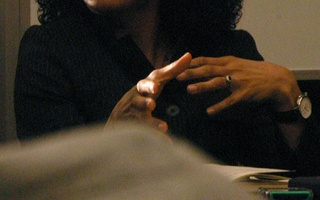During his sophomore year at Yale during the 1960's, Jim Sleeper said he discovered what it meant to be a radical activist.
He watched three young men give their draft notices to the college chaplain and proclaim, "We are not criminals. It is the government who is criminal to conduct this war in Vietnam."
Immediately, Sleeper said, he was attracted to the spirit of radicalism. In an informal speech last night to around 25 students in Harvard Hall, Sleeper described the methods and politics of activism.
The president of the Harvard College Democrats, Joseph N. Sanberg '01, introduced Sleeper as a man with a "maverick political outlook."
Sleeper received his doctorate from Harvard's Graduate School of Education and then became a journalist working as a reporter for the Village Voice and, now, the New York Daily News.
Throughout his talk, Sleeper urged the audience to examine the motives behind activism. He warned the audience of the evils of "moral posturing"--the pursuit of morality in activism without really grasping why the issue is moral.
"You have to understand," he said. "Who you are and why it is you are engaging in activism."
He described the figure of Rosa Parks during the Civil Rights Movement, saying that her moral witness shamed people--she stood behind something that was morally right without expecting a tangible reward.
"This is the kind of act that brought her nothing more than a larger affirmation," he said. "We have to find strength to take a stand against the powers that be."
Read more in News
Murakami's Fiction as Spicy as TofuRecommended Articles
-
Mechanical Means of Trisecting Angle FoundUndaunted by the fact that mathematicians have slaved for centuries over the problem of trisecting an angle, Harvey "Scott" Sleeper
-
Over the WireWASHINGTON--The fatal crash of an Eastern Airplanes sleeper plane near Atlanta today revived the bitter Congressional fight which last year
-
A Nervous RomanceW OODY ALLEN has finally become sexy. All right--maybe not exactly sexy. But certainly Allen's new film Annie Hall is
-
 Young Discusses Race, War, Culture
Young Discusses Race, War, Culture -
Ten Russian Spies Swapped in ViennaFormer Cambridge residents Donald H. Heathfield and Tracey L. A. Foley were among the 10 Russian spies who were flown to Vienna, Austria Friday to complete a spy swap with Russia.
-
Students Win Finance CompetitionFor some, third time’s the charm. But for a three-student Harvard team, once was all they needed to win the ...













